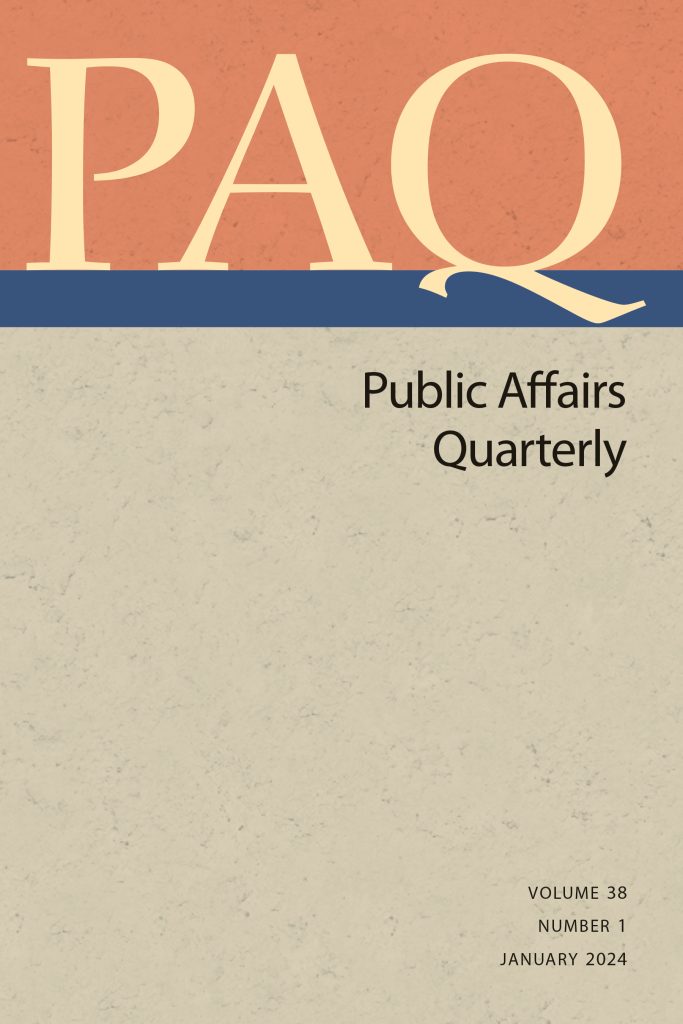Public Affairs Quarterly, edited by Jason Brennan, is a journal that publishes work in all areas of practically engaged normative philosophy, drawing from diverse theoretical and methodological perspectives.
Volume 38, Issue 1, is a special issue on effective altruism, guest edited by Theron Pummer, Ph.D., a philosophy professor at the University of St Andrews, whose research focuses on ethics. Theron defines effective altruism as “the project of using resources like time and money to help others as much as possible.” This special issue’s exploration of a prominent social movement presents readers with an in-depth look at the ongoing dialogues surrounding effective altruism.
Here, we present a Q & A to learn more about Theron’s background, effective altruism, and the process of editing a special issue.
Can you please share a bit about your background and research interests that led you to become the guest editor of this special issue of Public Affairs Quarterly?
TP: In 2010, I discovered effective altruism through the organization Giving What We Can and have been fascinated by the idea ever since. I have published influential work on the moral requirement to donate cost-effectively (see my 2016 article, “Whether and Where to Give”). I argue by analogy with nearby rescue cases for a requirement of effective giving: just as (other things equal) you’re morally required to save three drowning strangers rather than one, (other things equal) you’re morally required to send your donation to a charity that would use it to save three distant strangers rather than to a charity that would use it to save one. Given my work at the intersection of ethics and effective altruism, I was invited to be the guest editor of this issue.
How did this special issue come about?
TP: Effective altruism is a timely topic of public and philosophical interest. Particularly in the wake of the Sam Bankman-Fried debacle, too many discussions of the topic have become unhelpfully partisan, with people cheering or booing rather than listening to each other. The time is right to have a careful look at effective altruism, to try and understand what about it so many find good and what about it so many find bad. That is one reason this special issue exists. In addition, I believe the issue was partly spurred by [Public Affairs Quarterly’s editor] Jason Brennan’s grant project “Markets, Social Entrepreneurship, and Effective Altruism,” which won $2.1 million from the John Templeton Foundation.
Also on this subject is your 2023 book, The Rules of Rescue: Cost, Distance, and Effective Altruism. How do the ideas in your book work in conversation with the continued work being done in this area, as seen by the contributions to this special issue?
TP: In this book, I argue that we are often morally required engage in effective altruism, in the sense of directing our altruistic efforts in ways that help more rather than less. I defend this claim from a thoroughly non-consequentialist perspective: not only are there significant permissions not to spend your life helping others, but requirements to help others are not grounded in the promotion of the good per se. Requirements to help are instead grounded simply in the fact that helping would prevent significant harm to those in peril. I argue that whenever you can help a distant stranger in need there is a defeasible requirement (or “requiring reason”) to help, even if considerations of personal cost prevent it from generating a full-blown requirement to help. In his contribution to this issue, Thomas Sinclair raises an important objection to my argument for this claim. He argues that the bare fact that you can help someone in need isn’t enough to ground a defeasible requirement to help. Sinclair’s challenge is worth taking seriously.
How did you select the articles and contributors for this special issue, and what criteria were important to you in the selection process?
I primarily looked for excellent philosophers with interests relevant to effective altruism, who would likely be able to make novel contributions from a range of different perspectives. Beyond these basic criteria for selecting contributors, topicality was an important consideration. Once the four contributors confirmed their participation, I organized an online workshop to exchange early drafts and ideas. The workshop led to productive discussion, which helped further develop the articles that make up this issue.
What was the most surprising or interesting part of compiling and editing this special issue?
It was surprising how little I needed to do to ensure the contributions didn’t contain too much overlap. The contributors naturally landed on a good range of quite different topics. Sinclair’s contribution, mentioned above, is about the grounds and prevalence of moral requirements to help strangers. Other contributors address such topics as longtermism, population ethics, political objections to effective altruism as a social movement, and our reasons to fear death. These topics certainly do not cover the full range of possible topics within the general space of effective altruism, but they cover very different parts of this space.
At the end of your introduction, you talk about how the philosophical debates around effective altruism have undergone quite a bit of change in the past decade and that there is much more to explore. What do you foresee as the next steps? Are there any emerging trends?
We are making progress working out the philosophical bases of effective altruism. You don’t need to be a consequentialist to think there are moral reasons to engage in the project of effective altruism. But what forms of non-consequentialism support effective altruism, and what forms of effective altruism do they support? Views that endorse deontological constraints on doing harm won’t rank interventions as a pure consequentialist would. There are similar questions about the philosophical bases of longtermism, the view that shaping the far future is one of the most important moral priorities of today. As Tina Rulli’s contribution shows, some forms of longtermism rely on controversial claims in population ethics. But it may for all that turn out that some form of longtermism or another is supported by any of the major positions in population ethics. In addition, there are underexplored philosophical questions about power, democracy, and coordination that arise in connection with the political dimensions of effective altruism. This includes the political dimensions of the problems that effective altruism aims to tackle (like global poverty or AI) as well as of the effective altruist social movement itself. These are just a few relevant philosophical debates that are continuing to unfold.
Find Out More
Outside of special issues, topics generally covered by Public Affairs Quarterly include subjects of long-standing debate such as abortion, capital punishment, and just war theory; more recently emerging subjects of controversy such as climate change, affirmative action, commercial surrogacy, and the treatment of non-human animals; topics relating to current social movements such as those concerning racism and sexual harassment, and to current technological developments such as those involving gene editing and autonomous weapons systems; and cutting-edge issues that are just now on the verge of attracting attention from philosophers.
Submissions of a more general nature that address implications for a cluster of such issues rather than focusing on a single issue are also welcome, such as papers that advance claims that have practical implications but are about more general subjects such as race, sexuality, gender, social identity, nationalism, paternalism, privacy, distributive justice, economic fairness, political inequality, commodification, or desert.
- Individual subscriptions can be made through the University of Illinois Press website.
- To recommend this title to your library, fill out this Library Request Form.
- Ready to see your work featured in Public Affairs Quarterly? Submit original scholarly work here.


